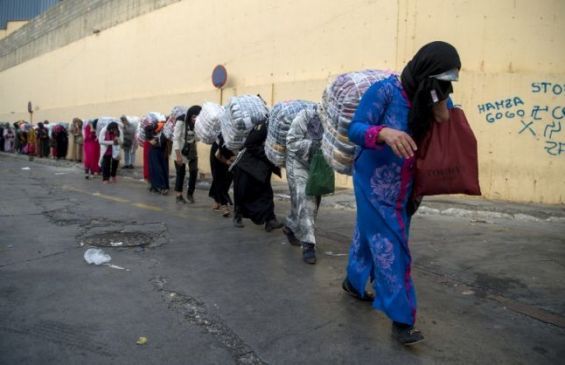According to the European Commission, Morocco and Spain must shoulder their responsibilities when it comes to Moroccan «mule women» who carry everyday heavy loads across the borders between Spanish enclaves Ceuta and Melilla and the Kingdom.
Questioned by left-wing MEPs about a potential «violation of the European Union Charter of Fundamental Rights» published on the EU’s official Journal on the 18th of December 2000, Commissioner for internal affairs and migration Dimitris Avramopoulos decided to avoid answering by reading some of the Charter’s principle, especially Art 31, reports El Faro de Ceuta.
«Every worker has the right to working conditions which respect his or her health, safety and dignity», indicates the Charter, adding that «every worker has the right to limitation of maximum working hours, to daily and weekly rest periods and to an annual period of paid leave».
Morocco and Spain should solve the problem
Unfortunately, Moroccan mule women do not benefit from the clauses set by the EU Charter. Their activities, however, benefit traders operating in Nador and Al Hoceima.
«National authorities are the ones responsible for evaluating» this file, said the EU commissioner. The European Commission is «aware of the situation in Ceuta, Melilla and in the borders separating Morocco and Spain. The huge number of people trying to cross these borders daily makes it hard and leads to disorder», said Avramopoulos.
Finally, the Commissioner for internal affairs and migration pointed out that «there are specific controlling measures at the El Tarajal II border post aimed at reducing border pressure and regulating the daily influx».
In April, a new initiative was implemented to allow mule women to carry their goods on trolleys, making it easier and more practical for them.
The new measure applied by the Ceuta authorities came into force following the pressure put by NGOs, which denounced the frequent incidents that occur while crossing border.
For the record, four women died last year in stampedes at the border post while trying to enter the enclave.
In March, local online newspaper El Faro de Ceuta announced that the city’s authorities «will ban pedestrians from carrying goods on their backs at the border crossing». The new measure’s objective is to «facilitate» the daily activities of the mule women.
Speaking to Yabiladi in a previous article on the matter, head of the Moroccan Organization for Human Rights Boubker Largo stated that porters who carry on a daily basis more than 50 kilograms (110 pounds) on their backs will still be able to do so even if the decision is applied. «It will always be possible for these women to carry small boxes and packages (60x40) on their backs. As for other goods, they have to carry them on trolleys».




 chargement...
chargement...












